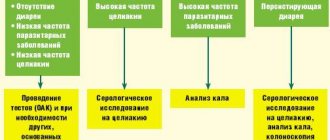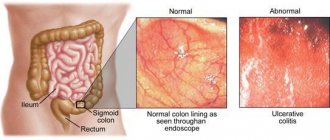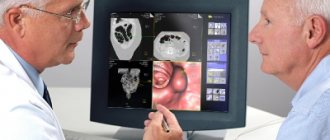Neurosis of the stomach and intestines often occurs due to stress and poor lifestyle. This means that most modern people are at risk. Delayed diagnosis will lead to progression of the disease and increased damage to health. The consequences can be serious weight gain, ulcers, chronic intestinal diseases and much more.
In this article we will talk about the symptoms and treatment of gastric neurosis. We will also try to find out what causes the disease and how to prevent it.
Why does the disease occur?
When we talk about the common causes of intestinal and stomach diseases, they are often caused by bacteria, hereditary predisposition, and acquired chronic pathologies.
But do not forget that the vagus nerve is involved in organizing proper gastric secretion. When it is at rest, secretion occurs normally and the person feels comfortable. But psychological shocks and past illnesses, as well as simply constant anxiety, can lead to serious problems.
Among the common causes of gastric neurosis are:
- Problems of a psychological nature. They arise when a person feels constant anxiety, is dissatisfied with himself, or experiences a tragic event. Psychologists note that neurosis can cause a break with a loved one, being in a negative environment in a team at work, or the loss of a relative.
- Wrong lifestyle. The nervous system suffers due to lack of sleep, poor work-rest balance, and constant severe stress.
- Nutrition problems. The gastrointestinal tract makes itself known when you eat a lot of fatty, heavy foods, consume a lot of sweets and starchy foods. Poor diet is another risk factor. To avoid getting sick, you should give up frequent snacking and balance your diet.
- Past illnesses. Many viral diseases, as well as problems with the stomach and intestines, quickly provoke neurosis. The problem appears against the background of gastritis, neoplasms, ulcers and other problems.
- Negative effects on the gastrointestinal tract. The disease can manifest itself after severe poisoning, as well as during intoxication, against the background of bad habits.
What is gastric neurosis?
All systems of the human body have nerve endings, so neurosis can occur in any organ.
There are especially many of them in the gastrointestinal tract, and therefore gastric neurosis occurs quite often. Psychosomatic causes usually do not cause severe pathologies of the stomach. But pain during the development of this pathology is felt quite strongly, which is why the quality of life of the sick person is significantly reduced. Feeling severe pain, people often do not want to believe that the cause of their occurrence is psychological. However, it is important to take into account that a prolonged depressed state causes a general decrease in immunity, and failures of the immune system can provoke the development of various infectious diseases.
Psychiatrist consultation
treatment of neuroses at home and in the clinic
rehabilitation until complete recovery
We work around the clock
Call a doctor at home Leave a request and we will call you back in 1 minute
8
Or call
Symptoms of the disease
The disease begins to manifest itself at a fairly early stage, so examination using modern diagnostic methods allows you to choose the right treatment method and get down to business.
Neurosis of the stomach and intestines is manifested by the following symptoms:
- Constant feeling of hunger. It does not disappear even after a heavy meal.
- Bloating, increased gas production. May be accompanied by colic.
- Discomfort in the abdomen. There is pain, heaviness, and a pulling sensation.
- Heartburn. It occurs in the abdomen and can spread to the sternum area.
- Belching. Sometimes a person cannot control the urges. Belching is accompanied by loud sounds and an unpleasant odor.
- Aversion to food. Often, not only the smell, but also the sight of food can cause nausea and severe psychological rejection in a person.
Psychologists also note such signs as the manifestation of a chewing reflex even when there is nothing in the mouth. Patients complain of severe nervous agitation, problems with sleep, and panic attacks. Phobias may also appear. The head begins to ache and feel dizzy, blood pressure rises, and hypochondria is observed.
Neurosis - symptoms and treatment
Treatment of neuroses is divided into two methods - psychotherapy and pharmacotherapy. The most optimal results can be achieved with a complex combination of two methods.
The need to introduce pharmacological agents, in particular psychotropic substances, arose due to the impossibility of providing high-quality psychotherapeutic assistance to everyone. Summarizing my experience in treating neuroses, I can say that very often the use of drugs is very helpful in starting treatment. This is applicable and indicated for those patients who at first find it very difficult to open up to the doctor; they consider their life to be already prosperous. Over time, while they take the drugs, they feel an improvement and then more willingly agree to psychocorrection.
And now there are supporters of only a psychotherapeutic or only a pharmacotherapeutic approach. It seems more rational to determine an individual treatment plan in each specific situation. Since we are talking about psychotrauma as a starting point, not a single case of neurosis can do without psychotherapy. Whereas many patients do not need to be prescribed medications.
Pharmacotherapy
Of all the psychotropic drugs, tranquilizers have become the most popular in the treatment of neuroses. Now there are a huge number of them on the market, and if necessary, the doctor will determine the one that is suitable for a particular patient.
Tranquilizers allow you to achieve many positive goals:
- reduce the emotional excitability of patients;
- improve sleep: patients fall asleep better, sleep quality improves;
- reduce vegetative manifestations of neurosis;
- reduce irritability and nervousness.
In addition, neuroleptics, antidepressants, and various psychostimulants can be used for treatment among psychotropic drugs. General strengthening drugs (vitamins, nootropics, neuroprotectors) are widely used.[9]
The course of treatment is individual and is selected depending on the degree of influence of biological factors on the occurrence of the disease. Drugs are selected taking into account the characteristics of the patient, the intensity of symptoms and types of neurotic syndromes.
Psychotherapy
It is well known and constantly confirmed in practice that most patients are completely unaware of the significance of many life situations and circumstances that in one way or another led to the disease. At the initial appointment, patients declare the well-being of their lives, even while presenting typical neurotic complaints.
This is due, on the one hand, to the conscious attitude “not to think about bad things” and ignorance of the possible degree of influence of psychological and social factors. On the other hand, often doctors of clinical specialties, whose field of view includes patients with neuroses, do not have sufficient qualifications to identify these factors.
The goal of psychotherapy is for the patient to understand the impact of traumatic situations on his illness. This is an important component of treatment. It is necessary to change a person’s attitude towards those situations, to give him new experience and to gain experience for the future. Often it is necessary to remove the patient from “his childish position”, which manifests itself in the use of childish ways of responding. Neuroscientists have proven that the neural pathways of reaction and formation of emotions are formed in humans before the age of seven.[10] Accordingly, our task is to expand the ways we respond. To get results, you need to change your life.
Psychoanalysis, person-oriented therapy, and suggestive (suggestion) psychotherapy were previously used as a method of psychotherapy. Today we have a much greater variety of techniques: neuro-linguistic programming, body-oriented therapy, systemic psychotherapy, metaphorical associative maps, personal and program-oriented coaching. It should be remembered that often it is a combination of different methods that gives effectiveness.
Breathing exercises and massage
Breathing exercises and massage are effective in treating neurosis, but they are additional means. They, like other treatment methods, are prescribed by the attending physician. He explains to the patient what kind of breathing exercises, how often and for how long to perform, and most importantly, why it is needed and what effect should be expected from it.
Folk remedies
The effectiveness and safety of traditional medicine methods have not been scientifically proven. Before taking sedative herbal remedies, you should consult your doctor.
How to help a loved one with neurosis
The participation of loved ones in therapy is also determined by the attending physician; in the treatment of neurosis, by a psychotherapist. The doctor will explain how family members will help.
Diet and lifestyle recommendations
For neurosis, universal methods of general nonspecific prevention are recommended:
- reasonable work and rest schedule;
- balanced mental and physical activity;
- getting enough sleep at night;
- good nutrition;
- active and varied leisure time.
When treating neuroses, diet is not important. It will be useful to eat regularly and balanced.
Our offers
Our clinic treats mental disorders in Moscow.
If you have symptoms of stomach neurosis, contact us. We employ experienced psychiatrists. They specialize in the treatment of psychosomatic diseases of various internal organs caused by psychological reasons. Our doctor will examine you, perform the necessary tests, after which he will make an accurate diagnosis and provide appropriate treatment. If necessary, a psychiatrist can visit your home.
Call by phone
Reasons for the development of pathology
The main causes of gastric neurosis are:
- Leading an incorrect lifestyle. Lack of daily routine, constant stress, lack of healthy sleep, excessive physical and emotional stress.
- Poor nutrition, heavy consumption of junk food, dry snacks.
- Neoplasms, ulcers, gastritis.
- Negative influence of factors on the functioning of the gastrointestinal tract.
- Active development of diseases caused by the penetration of viruses into the body.
- Conflict situations both with oneself and with others.
As a rule, to eliminate stomach neurosis, it is enough to simply change your lifestyle and review your diet.
Diagnosis of gastroneurosis
Many signs and symptoms of gastric neurosis are identical to those that develop with gastritis.
Therefore, to correctly diagnose this disease, it is important to pay attention to the presence of psychological symptoms, such as rapid heartbeat, headaches, overexcitation, insomnia, panic attacks, phobia, hypochondria, etc. Characteristic signs of gastric neurosis in children are nervous vomiting, not accompanied by nausea. In adults, this disease often manifests itself in the form of anorexia (complete lack of appetite) or bulimia (a condition in which a person eats too much food). Both of these pathologies are dangerous and can ultimately even lead to death.
Types of neurotic disorder
All neuroses go through 3 stages . The first of them lasts 1 month and is characterized by acute mental trauma. If its consequences were not noticed in time, then the process develops, certain reactions appear and awareness of one’s “abnormal” state occurs. When the disorder lasts from six months to 2 years, they speak of its second stage.
If the disease is not eradicated in the first two stages, it becomes a chronic disorder with persistent changes in the personality structure.
There are three most common types of neurosis : neurasthenia, obsessive-compulsive neurosis and hysteria.
The main symptoms of neurasthenia are exhaustion and increased fatigue against a background of irritability and hyperexcitability. Other symptoms may also occur: increased sensitivity to bright light, temperature changes, loud conversations. Autonomic disorders also appear: tachycardia, increased sweating, headaches. It is difficult for the patient to concentrate and tune in to any activity.
Hysteria is a type of neurosis that is nicknamed the great malingerer for the variety of its symptoms. The hysterical type of character contributes to its development.
Among the manifestations of the disease are attacks of suffocation, sobbing or laughter. It can masquerade as a hypertensive or cardiac crisis. There is temporary immobility and loss of sensation in the limbs. Neurotic deafness and blindness rarely occur.
Probably the most well-known symptom of the disorder is an attack of hysteria. With it, a person faints, but, surprisingly, very successfully. Convulsive-like seizures may occur. Patients wave their arms, “killed” by suffering, their body bends into an arc. Such an attack is demonstrative in nature. Women are more often susceptible to them.
Despite the depressing, painful symptoms, patients do not strive to get rid of this condition. On the contrary, they skillfully manipulate it. Whenever there are any complaints against them, they refer to their “serious” illness. As a rule, such individuals are demonstrative and self-centered.
Be careful: hysteria can be contagious! This was proven by a case in one of the schools in Tanganyika. The three girls laughed so contagiously that their laughter was echoed by 95 students. The maximum duration of the attack was 16 days. This school was closed, but 14 more schools took up the baton. In total, about a thousand students suffered a hysterical attack. Poor living conditions of the hostel in which they lived and the inability to make a claim are considered a possible cause of hysteria among the girls.
Obsessive-compulsive neurosis is another form of the disease in which certain thoughts, actions, and fears become so intrusive that a person perceives them as painful, they interfere with his usual way of life.
Among the most common phobias are fear of death, fatal disease, heights, confined spaces, and others.
Fears can also provoke obsessive actions. Thus, individuals strive to constantly wash their hands so as not to “catch any infection”, disinfect everything around them, and avoid public places.
Compulsions can also occur on their own. For example, there is an uncontrollable desire to swear or do something illegal.
The famous inventor Nikola Tesla suffered from obsessive-compulsive disorder. His mania reached the point where he could count steps, cups of coffee or pieces of food. He was terrified of germs, which is why in a hotel he demanded that towels be changed up to 18 times a day, and in a restaurant, if a fly landed on the table, he demanded that it be reserved. The hotel room had to be a multiple of three.
What is the diagnosis based on?
The diagnosis is made by a neurologist or psychiatrist. The specialist interviews and examines the patient and conducts a psychological examination.
It is very important to exclude somatic diseases when diagnosing neurosis, because many of its symptoms are similar to manifestations of pathologies of internal organs. For this, the patient is prescribed a series of laboratory and instrumental examinations: ultrasound, X-ray, CT, MRI, vascular examination, esophagogastroduodenoscopy (EGD).
After excluding such diseases, differential diagnosis is carried out with other mental illnesses: psychopathy, schizophrenia, manic-depressive disorder. An important assessment criterion is the person’s awareness of his illness and the desire to get rid of it.
What is this
Irritable bowel syndrome (IBS) is a reversible disorder characterized by bowel complaints such as pain, cramping, bloating, constipation, or diarrhea caused by overstimulation of the nervous system.
Some experts consider IBS to be a separate disease, while others consider it to be a syndrome (that is, a combination of several symptoms) that can be observed in various diseases and conditions. But everyone agrees that this common disorder is a consequence of reversible disorders in the functioning of the nervous system.









